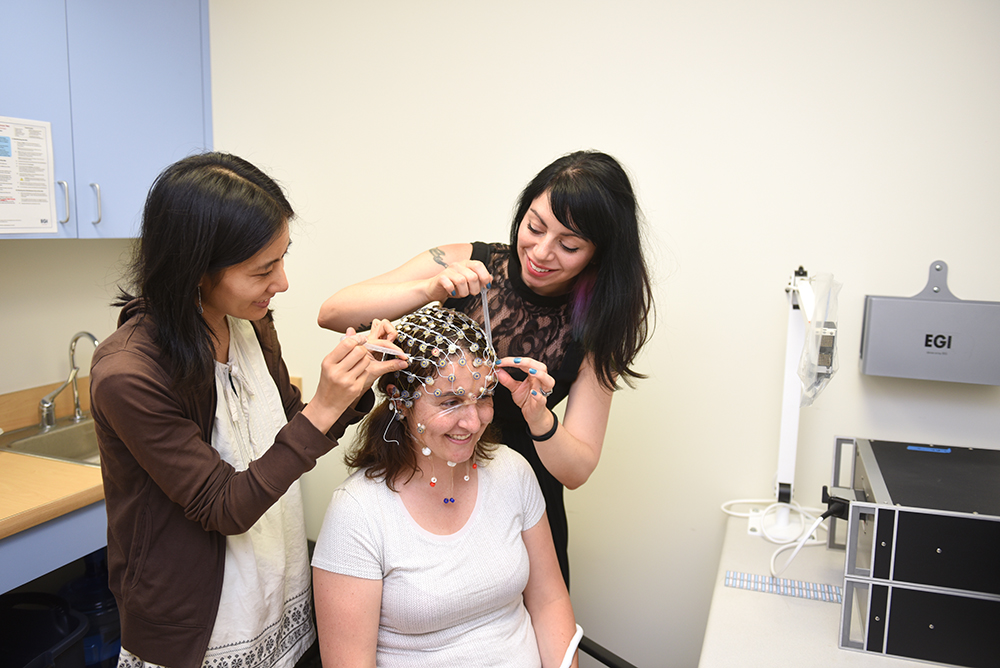The Ruth S. Ammon School of Education Department of Communication Sciences and Disorders (CSD) plans to relocate all its various laboratories to Linen Hall in the coming months.

The Ruth S. Ammon School of Education Department of Communication Sciences and Disorders (CSD) plans to relocate all its various laboratories to Linen Hall in the coming months. Six of the nine CSD labs currently have no assigned space, having been replaced by new faculty offices. Exceptions are the labs directed by Reem Khamis-Dakwar, Ph.D., Ashwini Namasivayam-MacDonald, Ph.D., and Ryan Lee James, Ph.D.
Neurophysiology in Speech-Language Pathology (NSLP) Lab
Director: Reem Khamis-Dakwar, Ph.D.
Hy Weinberg Center, Room 114
Research at the NSLP Lab focuses on examining the neural underpinnings of language learning in specific sociolinguistic situations and specific communication and language disorders, as well as during rehabilitation, using event-related potentials (ERPs) recorded from 32 electrode arrays placed on the scalp, combined with behavioral data.
Dysphagia Lab
Director: Ashwini Namasivayam-MacDonald, Ph.D.
Harvey Hall, Room 111
Research in the Dysphagia Lab (aka the Aging Swallow Research Lab) focuses on understanding and treating swallowing impairments in the elderly. Functional swallowing involves moving food or liquids (the bolus) through the mouth (oral cavity) and throat (pharynx) in as little as one second, without the bolus going into the airway (aspiration) and without residue being left behind. It is an ability that is critical for life, taken for granted and significantly understudied. Current research in the lab focuses on understanding the pathophysiology of swallowing in dementia, elucidating the relationship between malnutrition and dysphagia in the elderly and determining the burden of dysphagia for caregivers of the elderly.
Dialect, Development and Language Disorders Lab
Director: Ryan Lee James, Ph.D.
Harvey Hall, Room 111
The aim of the Dialect, Development and Language Disorders Lab is to continue to unpack the complex relationship between nonmainstream dialect use and language disorders, cognition and literacy achievement. Specifically focused on school-age children from preschool to fifth grade, the goal of the research conducted in the lab is to improve quality of speech-language services for low-income, language-minority children with the long-term goal of reducing health disparities for this population.
Neurocognition of Communication Disorders (NCCD) Lab
Director: Melissa Randazzo, Ph.D.
The NCCD Lab conducts experiments examining the neural underpinnings of multisensory integration in relation to linguistic and cognitive processing in healthy aging and aging-related disorders. We utilize a combination of behavioral and electrophysiological techniques to conduct clinically relevant investigations to inform diagnosis and treatment of communication disorders. Additionally, the NCCD Lab supports student research at the undergraduate, master’s degree and doctoral levels by providing support in the development of clinically relevant research questions and hands-on training with neuroimaging equipment.
The Voice and Quality of Life Laboratory (VQLL)
Director: Steven Cox, Ph.D.
The VQLL seeks to investigate clinically based research questions focused on the human voice and how voice disorders can impact individuals’ physical, psychological and social functioning. Particular emphasis is placed on individuals who undergo treatment for head and neck cancer. For example, individuals who have their voice box removed due to cancer often require an alternate method of speaking (e.g., alaryngeal voice and speech). As a result, they can experience numerous changes in physical, psychological and social functioning. The VQLL focuses on the role of speech-language pathology and interprofessional intervention in improving the quality of life for individuals with voice disorders, including laryngectomies.
The Language Observation and Analysis Laboratory
Director: Dana Battaglia, Ph.D.
The Language Observation and Analysis Laboratory houses behavioral monitoring equipment, such as E-Prime software and SALT. Research at the LOA Lab focuses on examining the nature of word associations in typical and clinical populations. At present, the focus of the lab is to investigate word association in individuals with autism spectrum disorder, using both behavioral (explicit) and neurophysiological (implicit) methods.
Augmentative/Alternative Communication (AAC) Lab
Director: Cindy Arroyo, D.A.
The AAC Lab provides evaluations and consultations for individuals with severe communication impairments, as well as opportunities for teaching and research in the use of technology for individuals with severe communication impairments.
Speech Science Lab
Director: Laura L. Koening, Ph.D.
The Speech Science Lab was originally developed by Professor Lawrence Raphael, Ph.D. It includes specialized hardware and software that can be used to assess speech acoustics, aerodynamics (oral airflow) and articulatory contacts (electropalatography). Dr. Koenig, who joined Adelphi last year, has been working to add to and modernize this equipment. We have recently obtained newer equipment to measure air pressures during speech, a portable digital audio recorder that provides high-quality sound recording and can be used off-site, and a wireless microphone system—quite useful for recording young children, since they can move freely while being recorded.
Telepractice Lab
Director: Dawn Cotter-Jenkins
Telepractice is an alternative method of reaching clients for speech-language and audiology services in aphasia, fluency, articulation, accent modification, hearing impairments and language disorders. Through technology, services can be provided from Adelphi’s Hy Weinberg Center Telepractice Lab to the client in their remote location. We train clinical master’s degree-level students in providing in-depth therapeutic assessment and intervention. The implementation of the program ensures that we continue to provide innovative clinical learning experiences that will keep us up-to-date with standards and trends.
For further information, please contact:
Todd Wilson
Strategic Communications Director
p – 516.237.8634
e – twilson@adelphi.edu